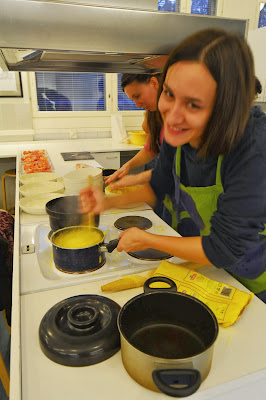The pedagogical teams of all participant counries, within the framework of the Multilateral European School Partnership, Comenius, visited the city of Lappeeranta, Finland from 7/10/2013 to 11/10/2013.
It is important to state that this meeting concerned educators only, since it took place at the beginning of the school year and in that meeting were set the ground rules of the whole project as well as the details of the mobilities.
It is important to state that this meeting concerned educators only, since it took place at the beginning of the school year and in that meeting were set the ground rules of the whole project as well as the details of the mobilities.
The Greek team was represented by 5 teachers of the 11th Gymnasium of Larissa.
.jpg) |
| Presentation of the Greek comenius-blog by Fivi Baloti, the Greek coordinator |
During the visit the participant teachers introduced their schools and the pedagogical system of their countries and exchanged views on how to organise the Program. They also renewed the schedule of activities and finalized the dates for the next mobilities. The teachers were shown around the host school and the Finnish-Russian school of the city. They also visited the Town Hall where they were informed about structural, economic, social and cultural matters. They also went on a sightseeing tour and they took part in activities related to Finnish Culture.
Lappeeranta
Lappeenranta is known as the International University City in Finland. It is also the Commercial Center of South-East Finland and the meeting point of the EU and Russia 215 km away from both Helsinki and St. Petersburg. Location on the southern shore of the lake Saimaa it is the regions’ centre for tourism. Thus it also has an on-competition with Helsinki for the title of the largest city in Finland based on Tax Free sales.
Lappeenranta has 72.000 residents. It is a big small city which has a sociable atmosphere, plenty of versatile opportunities for work and education especially due to Lappeenranta University of Technology (LUT) and a variety of culture and sports around the year. LUT has a visionary role in renewable energy solutions and it continuously grow greener via various environment programs. In lappeeranta also, is under construction, the world’s first biodiesel plant.


Walking in the forest
The Finnish school
Kesämäenrinteen koulu is a state secondary school in eastern Finland. It is one of five secondary schools in the town, and has the speciality of languages/ international work. There are around 430 students in 7th-9th grades (12-16 year olds) and 34 full time teachers. The school is situated in Lappeenranta – a town which is the centre of a mainly agricultural region near the border with Russia. The wood/paper industry is also important in this area.
The European team

 |
| International teacers' team |
The Greek team

 |
| Greak teachers' team |

With our friends

 |
| Coordinators |

Cooking activities




Publicity
Summary of the 1st visit
The first full project meeting was held at Kesämäenrinteen koulu in Finland from October 7th-11th 2013.
There were teams from all eight partner countries present and, as this was the first time that all partners were together, time was spent on introductions and group-building exercises.
The formal agenda items and discussion centred on organization of the project over the next two years. The proposed project structure was reviewed and amended to maximize student mobilities within the limits of the budget. Another issue raised was the importance of travelling students having the possibility to stay with host families in order to deepen the educational/cultural experience. The project website was established atwww.youthineurope.webs.com and each partner country agreed to make their own national blog which would be linked to this website.
In the discussions, Poland and Bulgaria said that they would have problems finding enough host families, while Romania asked to be included in the programme of visits. The Finnish team said that it would make a maximum of three visits because of its extra travelling costs (Northern location!)
Effectively, Romania took the activities connected to the cancelled visit to Poland, while Poland took the activities previously allocated to Romania. Specific dates were made for the first three mobilities.
Romania 24.3-28.3.14
Greece 5.5-9.5.14
Turkey 29.10-3.11.14
and provisional dates for the last two
Bulgaria 23.3-27.3.15
Spain 4.5-8.5.15
It was agreed that the host country would chair the respective project meetings.
The overall atmosphere of discussion and joint decision making was very positive.





































No comments:
Post a Comment